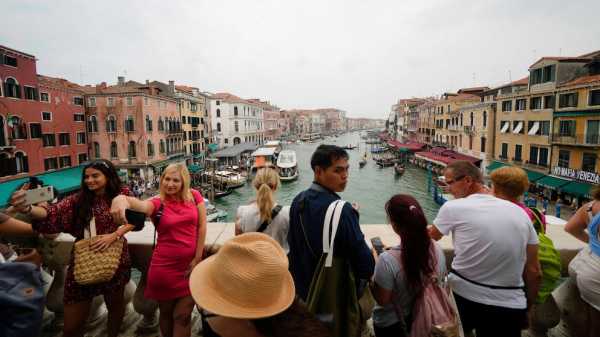
VENICE, Italy — A scowling gondoliere ferrying sightseers 10 at a time across the mouth of Venice's Grand Canal scolds passengers to sit still and frets over being shorted the bargain 2-euro fare.
The brief journey perched along the sides of a packed gondola is a far cry from romantic scenes of gondolieres serenading couples as they ply Venice’s picturesque canals but is emblematic of the city's plunge into mass tourism.
The storied and fragile lagoon city is not alone in its struggle to manage an onslaught of tourists in the low-cost flight era. But the stakes are particularly high this week as the UNESCO World Heritage Committee decides whether to add Venice to its list of endangered world sites. A decision could come as early as Thursday.
A declassification would appear an indictment of the city’s management of tourism, after it escaped a downgrade two years ago when the Rome government enacted a ban on cruise ships off St. Mark’s Square and in the Giudecca canal.
“We are trying to avoid this,’’ said Michele Zuin, Venice’s top budget official. “But it is not as if we are slaves of UNESCO.”
The decision comes just days after housing activists announced over the weekend that the number of tourist beds in Venice now outnumbers the number of residents, citing official city data. A ticker updating the number of tourist beds in a bookstore window aims to keep the alarming trend high in the minds of citizens, interplaying with another nearby that counts the dwindling number of citizens.
Tempers flew at a city council meeting this week ahead of a vote that made Venice the first city in the world to charge visitors an entrance fee. Local television clips showed the mayor and a political opponent trading heated insults over the dais as a crowd of concerned citizens overflowed into the corridor.
Critics charge that the tax was rushed through to impress the UNESCO committee that the city is acting to curb mass tourism. Visitors will be charged 5 euros a day to enter the city on 30 high-traffic days, still to be determined, in a much-truncated version of a day-tripper tax that was set to begin before the pandemic took a hit at global tourism.
UNESCO officials have emphasized that a downgrade is not meant to be punitive, but to alert the world community that more needs to be done to address issues plaguing a World Heritage site.
The recommendation to downgrade Venice cites not only management of mass tourism, but also the impact of climate change. It notes, for example, that the underwater barriers to protect Venice are not yet fully operational.
Venice is one of six sites, including two in war-ravaged Ukraine, that the committee may officially declare to be in danger.
The other at-risk sites under consideration are the Saint Sophia Cathedral in Ukraine’s capital, Kyiv; the historic center of Lviv, in western Ukraine; the ancient city of Nessebar in Bulgaria; the Diyarbakir Fortress in Turkey; and the Kamchatka Volcanoes in Russia’s far east.
Sourse: abcnews.go.com






